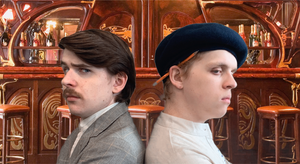
Tickets are $15 for the General Public, $12 for adults over 60 and under 18, and Catawba College alumni. Tickets are free for Catawba students, staff, or faculty.
Picasso at the Lapin Agile is written by Steve Martin – actor, comedian, playwright, novelist, short story author, essayist, producer, musician, and modest recipient of multiple awards.
The Production Staff for Picasso at the Lapin Agile includes Professor David Pulliam (Director and Scenic Design), junior Hayley McCann (dramaturg), junior Tristen Surgeon (Assistant Scenic Design), Department of Theatre Arts chair Professor Erin Dougherty (Costume Design), adjunct Professor Rodney Oden (Lighting Design), senior Zac Hunter (Assistant Lighting Design), Sophomore Winter Hamilton (Assistant Lighting Design), first-year Kerala Banniser (Stage Manager), and first-year Alana Williams (Assistant Stage Manager).
“We are delighted to have Bob Paolino as our guest artist on Picasso at the Lapin Agile,” says director David Pulliam. “Bob brings an enormous amount of acting and performance talent to the show. He has been an outstanding mentor to the cast. Bob’s willingness to share his artistry with our students shows the heart and soul of the arts community in Salisbury and Rowan County. Catawba Theatre Arts would, quite literally, not exist without the support of this vibrant community of gifted artists such as Bob.”
“Both Einstein and Picasso are on the cusp of their big, major breakthroughs that will change the 20th century,” director Pulliam says. He adds: “It sounds like a joke or a cliché but ‘Picasso and Einstein walk into a bar’ is a wonderful way to put two of the greatest minds of the 20th century together and have them argue about deep artistic and scientific and philosophical concepts. And love. They also argue about love. This is Paris after all.”
The time is 1904, and the place is Paris. The scene is the Lapin Agile, a local pub and gathering place in the heart of Montmartre, where struggling creators meet, compare notes, and debate about truth, beauty, freedom and love. This day is exceptional because today two creative, free-thinking men, both on the edge of greatness, meet and share their deepest thoughts.
Albert Einstein (sophomore Andrew Moore) has come to the Lapin Agile hoping to meet a woman who “thinks like I do.” A young painter named Pablo Picasso (sophomore Camden Trimmer) drops by for a drink and to meet an old flame. Both men are in their 20s, both are close to changing the course of science and art.
Picasso’s painting Les Demoiselles d’Avignon was revolutionary because Picasso defied everything “normal” in Western painting up until that point: he smashed idealized notions of beauty, did away with conventions of perspective, and worked with styles inspired by Iberian and African art.
At the same time, Albert Einstein initiated a scientific revolution with the publication of his papers on relativity. For three centuries, Sir Isaac Newton and his laws of motion and gravity were the final word in physics. Then along came Einstein with a newfangled and revolutionary theory of general relativity that turned Newton on his head. Rather than perceiving space and time as fixed entities as Newton did, Einstein imagined space and time as dynamic, dependent on frames of reference. And he formulated the equations to prove it – the famous Energy equals mass times the speed of light squared, or E=mc2.
Soon the Lapin Agile is filled with, as Freddy (sophomore Cameron Barns) the owner says, “people with fascinating opinions” – who voice them loudly – including the “newly old” raconteur Gaston (guest artist Bob Paolino), “The ‘third’ genius” Charles Dabernow Schmendiman (first year Aiden Sterrett ), Clovis Sagot (first year Evan Moreno) an art dealer “known for his sense of humor,” the wise bartenderess Germaine (first year Kris Wooten), and the ultimate fangirl Suzanne/the Countess/female admirer (sophomore Sarah Bedini). When “the Visitor” (first year Justin Gerstle) arrives in his blue suede shoes, magical moments fly thick and fast.
As Steve Martin says "Focusing on Einstein's Special Theory of Relativity and Picasso's master painting, Les Demoiselles d'Avignon, the play attempts to explain, in a light-hearted way, the similarity of the creative process involved in great leaps of imagination in art and science. Pablo Picasso, as a historical figure, does not come gift-wrapped for the sensitive. He lived as he painted, fully sexual and fully daring, and in the play, he is chastised by a Germaine for his cavalier behavior toward women.”
The questionable behavior sometimes evident in the play is not endorsed, instead it is examined, grappled with, debated and experienced. We, the audience, learn by engaging with the objectionable and difficult not by hiding from it. But, in the end, a play like Picasso at the Lapin Agile exists to amuse and delight. Martin’s play makes us laugh at human folly and leaves us, in the words of critic George Nathan, “delighted, reinvigorated, and enlivened.”
Catawba does not offer advisories about subject matter, as sensitivities vary from person to person. If you have questions about content, age-appropriateness, or stage effects (such as strobe lights or theatrical fog) that might affect patron comfort, please contact the appropriate box office.
